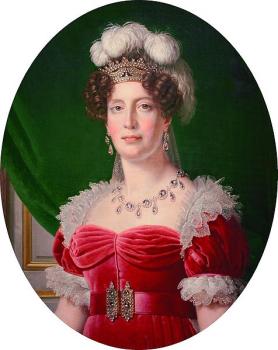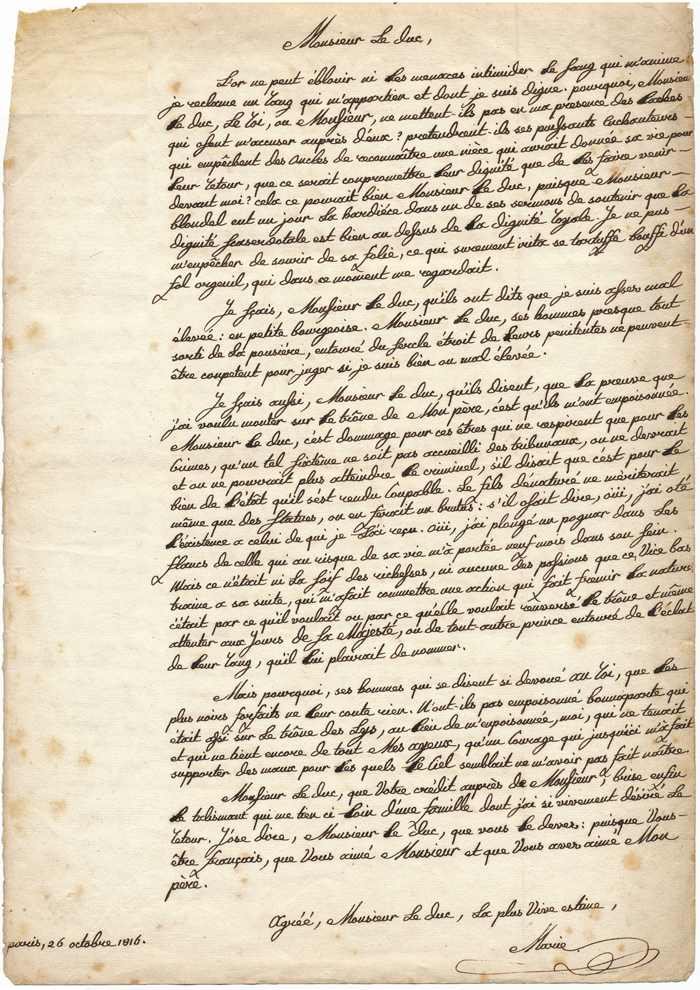Marie Therese de France
Marie Therese de France
Marie Thérèse de France Autograph Letter - 1816
Marie Thérèse de France aka Marie Thérèse Charlotte (1778-1851) was the eldest child of King Louis XVI of France and his wife, Queen Marie Antoinette.

This is a fascinating manuscript letter dated 26 October 1816, possibly in the hand of Marie Therese, but certainly describing historical events of state in which she is expressing deepest concerns of fairness in treatment and ascension to the throne of France. The correspondent to whom she writes is unknown, but she speaks of imprisonment and the poisoning of Napolean as well as herself, wishing only to return to her family. 1p, approx. 9.5 x 14″. Note: we are unable to ascertain at this time whether or not this letter is actually in the hand of Marie or perhaps a secretary, therefore it is being offered as a secretarial letter from that time period.
Translated in full:
My Dear Duke,
The brilliance of gold cannot overwhelm me, nor threats intimidate me as I strive to reclaim a position which belongs to me and of which I am worthy. Why, My Dear Duke, has neither the King, nor Monsieur seen fit to come to my side to confront those who accuse me? Do they claim that there are powerful enchanters who prevent uncles from recognising a niece who would have given her life to see their return. What is it that would compromise their dignity than to have them come? That could well be true, My Dear Duke, since Monsieur Blondel one day had the temerity to maintain in one of his sermons that priestly dignity should take precedence over Royal Dignity. I could not help but be amused at his folly, which surely enflamed his puffed up arrogance with which he looked upon me at the time.
I am aware, My Dear Duke, that they have said that I am badly brought up, a Petty Bourgeois. These men, almost all of them come from nothing, surrounded by their close circle of penitents, are not competent to judge whether I have been well or badly brought up.
I also know, My Dear Duke, that they say that the proof that I sought to ascend to my Father’s throne is that they poisoned me. It is a great shame for these poor beings who only live to commit crimes, that such a plot is not dealt with by the courts, that it should not, or could not any longer be considered criminal, if they say it is for the good of the State that they are found guilty. This wayward son does not even merit statues in his name, not even as a Brutus. If he had dared say ‘yes, I killed the person who came to me’. If he had dared say ‘yes, I plunged a dagger into the side of she who, at risk to her own life, carried me for nine months. But it is not the thirst for riches nor any other passion that such a low act brings, that made me carry out this terrible act that shakes the very core of nature, but it was rather because he or she wished to overturn the throne, even make an attempt upon His Majesty or any prince of the court he chose to name.
But why, if these men declare such strong allegiance to the King do they commit such dark deeds when it profits them not? Did they not poison Bonaparte, who had taken the French throne, instead of me. I, who have not, and have not still all my forebears and kin, but only the courage and the wish to do what it appears that God wants me to do and that I was born to do.
My Dear Duke, would that your favour with Monsieur work to break these cursed ties which keep me so far away from my family to which I do so strongly wish to return. If I may dare say so, it is indeed your duty so to do, as you are French, and, My Dear Duke, you love Monsieur, as you so loved my Father.
Please be assured, My Dear Duke, of my Highest Esteem.
Yours, Marie
Paris, 26th October 1816
Marie Thérèse de France aka Marie Thérèse Charlotte (1778-1851) was the eldest child of King Louis XVI of France and his wife, Queen Marie Antoinette. As the daughter of the king, she was a Fille de France, and as the eldest daughter of the king, she was given the traditional honorific Madame Royale at birth. She married her cousin, Louis Antoine, Duke of Angoulême, the eldest son of the future Charles X. Once married, she assumed her husband’s title and was known as the Duchess of Angoulême. She became the Dauphine of France upon the accession of her father-in-law to the throne of France in 1824. Technically she was Queen of France for twenty minutes, in 1830, between the time her father-in-law signed the instrument of abdication and the time her husband, reluctantly, signed the same document. She was the only child to survive the Reign of Terror.

